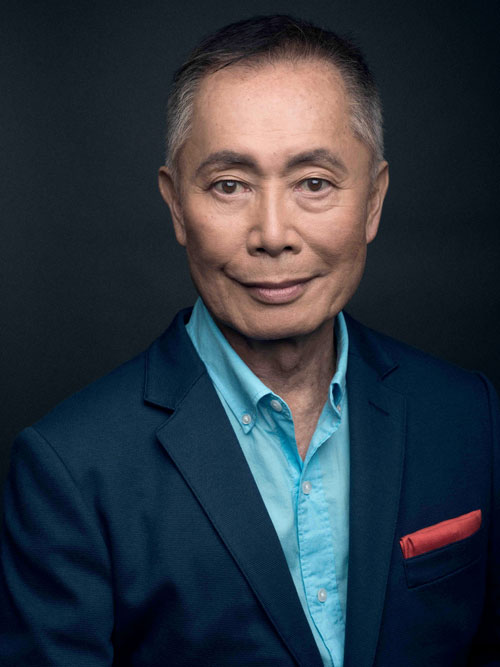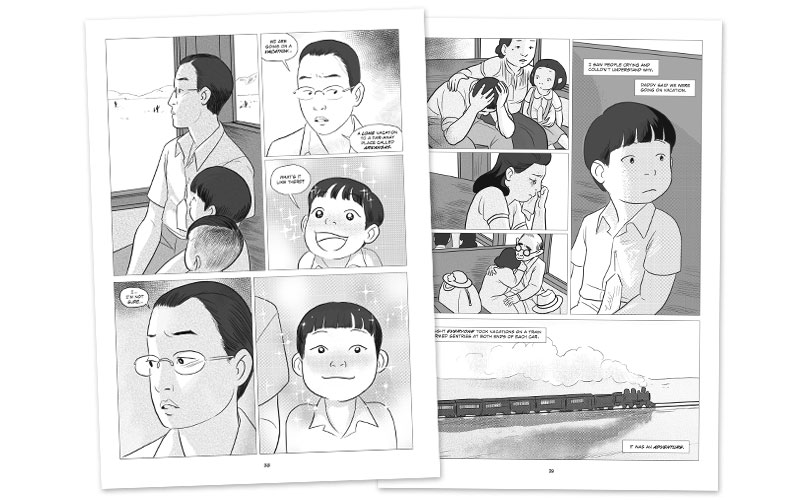“We Are Better Than This” | SLJ Talks to George Takei
Actor and activist George Takei is as impassioned as ever about social justice. The author of They Called Us Enemy, his graphic memoir, Takei spoke to Brigid Alverson about the Japanese American experience and how the lessons of history can inform the current struggle for democracy.
 |
Photo courtesy of George Takei |
The opening scene of George Takei’s graphic memoir They Called Us Enemy (Top Shelf, 2019) is a memory that is still vivid to the 82-year-old actor, although he was not quite five years old when it happened.
“My parents got us up very early” on that spring day in 1942, he recalls, “and my brother and I were told to wait in the living room while our parents did some last-minute packing in the bedroom. Suddenly, we saw two soldiers marching up the driveway, carrying rifles with shiny bayonets. They stomped up the front porch and with their fists began pounding on the front door. Bang! Bang! Bang!”
What happened next is the stuff of nightmares: Takei and his family were taken from their home and imprisoned, along with 120,000 other Japanese Americans, in camps situated in remote areas of the country.
The mass internment of American citizens and legal residents of Japanese descent followed the bombing of Pearl Harbor on December 7, 1941. On February 19, 1942, President Franklin D. Roosevelt issued an executive order enabling the creation of military areas from which “any and all persons” could be removed. California, Oregon, and Washington were declared military areas, and thousands of Japanese Americans were taken by force from their homes and imprisoned in concentration camps.
Takei’s book is a reminder of a dark period in American history, one that he cautions is being repeated in the present day.
Beauty in an ugly place
But his story is also a hopeful one: The Japanese American child who was once put on a train with a numbered luggage tag grew up to become an American icon, thanks to his acting role as Mr. Sulu in Star Trek, his public affirmation of his identity as a gay man, and his role as an activist for LGBT rights. What brought him through the ordeal of the camps was his parents’ love and their refusal to lose faith in the country that had betrayed them.
After the soldiers banged on the door, the Takei family was taken to the Santa Anita racetrack, where they were held for a few weeks, then transported to Rohwer, Arkansas. Rohwer was a concentration camp, Takei states emphatically. The reason for their incarceration was very clear: “We looked like the people who bombed Pearl Harbor,” he says.
Takei’s parents did their best to shelter their children from the reality of what was happening. They presented the trip as a vacation, and on the long train ride from California to Arkansas, his mother produced a series of treats from a bag of goodies to keep them entertained. Once they were settled in Rohwer, Takei’s father became the manager of their block of residences.
 |
They Called Us Enemy © George Takei, courtesy Top Shelf Productions/IDW Publishing. |
“He spoke English and Japanese fluently, so he could communicate with the immigrant generation as well as the American-born generation,” Takei says.
He also did what he could to improve morale. “Resilience isn’t all just teeth-gritting, strength, and fortitude,” Takei says, quoting his father. “It’s also the ability to find beauty in an ugly place, to find joy, and to fall in love.” His father organized a baseball league, dances for the young people, and talent shows for the old-timers to build a sense of community.
Takei’s parents shielded him from the awful uncertainty about what might happen next. When Takei was a teenager, his father talked openly about his feelings at the time. “He said the thing that tore him up the most was to see those barbed wire fences—they had guns pointed at us from the sentry towers—and wonder what’s going to happen to his kids,” Takei says.“
During one of those conversations, the teenage Takei questioned why his parents hadn’t fought for their civil rights, as African Americans were doing at the time. “I said ‘Daddy, I would have organized my friends at school and gone down to the federal building and we would have protested,’” Takei says. “And my father said ‘Well, the situation was different. I had to think about your mother, you, your brother, and your sister. They were pointing guns at me. If something happened to me, what do you think would have happened to you?’”
Takei was too young then to know how the soldiers and those who worked at the camps felt about what was happening, although he does depict some instances of kindness in the book. As an adult, though, he has heard from people whose parents worked in the camps. “One was a guard at the Tule Lake segregation camp, and her father was deeply sorry for it,” he recalls.
One of those advocating for the internment was California attorney general Earl Warren, who would go on to become Chief Justice of the Supreme Court. In 1942, he had ambitions of running for governor and rode the tide of prejudice against Japanese Americans. “[Warren] made an amazing statement,” Takei says. “He said, ‘We have no reports of spying or sabotage or fifth-column activities by Japanese Americans, and that is ominous because the Japanese are ‘inscrutable.’ You can’t tell what they are thinking. So it would be prudent to lock them up before they do anything.’”
The loyalty question
That suspicion began to dissipate as the war went on and the need for manpower in the armed forces increased. When the war broke out, Japanese Americans were classified as “enemy aliens.” Those who were in the service were told to surrender their weapons, and those who tried to enlist were turned away. By 1943, the government needed more soldiers, and the president declared that Japanese Americans could serve, provided they were “loyal citizens.” The internees who volunteered to join the army served in a segregated unit, which suffered heavy casualties and was one of the most decorated units of the war.
The government’s need to determine loyalty led to a moment of crisis for Takei’s parents, when they were asked “Will you swear loyalty to the United States of America and forswear your loyalty to the Emperor of Japan?”
“We’re Americans,” Takei says, still indignant 75 years later. “My mother was born in Sacramento, California. My father was a San Franciscan. We kids didn’t have to answer to that, but we were born in Los Angeles. For the government to presume that we had an inborn, racial loyalty to the emperor was insulting. So if you answered ‘no,’ meaning ‘I don’t have a loyalty to the emperor to forswear,’ that ‘no’ applied to the first part of the very same sentence, ‘will you swear loyalty to the United States?’ If you answered ‘yes,’ meaning ‘I do swear my loyalty to the United States,’ then that ‘yes’ applied to the second part.” Because Takei’s parents answered “no,” they were deemed “disloyals” and relocated to the more prison-like camp in Tule Lake, California.
 Life after camp
Life after camp
As the war drew to a close, the Takeis faced another choice: Whether to return home or stay in the camp. By then the danger was greater outside the camps, as anti-Japanese sentiment continued to rage.
When the internees were released, they were each given $25 and a one-way ticket to anywhere in the country. While their dry-cleaning business was gone, the Takeis returned to Los Angeles. The first home they could afford was on Skid Row. “The smell was intolerable,” Takei recalls, “and the sirens were shrieking day and night. At night, our room would glow red from the lights from the police cars.”
Things got better. Takei’s father worked at a series of jobs, and the family moved to a Mexican American neighborhood (where Takei learned Spanish and his mother learned to make enchiladas and tacos), and then to a mixed-race, middle-class neighborhood.
A people's democracy becomes a personal mission
Takei ends the book with a new turn of the wheel: On, June 25, 2018, the U.S. Supreme Court finally struck down the 1944 decision (Korematsu v. United States) supporting the internment of Japanese Americans, the same day the court upheld President Donald Trump’s ban on allowing people to enter the U.S. from Muslim countries.
“It’s chilling,” Takei says. “This has been an unending cycle, one minority after another. And here it’s happening again. The humanitarian outrage on the southern border, or the Muslim travel ban. It’s the same mentality that put us in those barbed-wire concentration camps.”
Nonetheless, Takei says, the reaction to the travel ban gives him hope. “Immediately after [the ban], thousands of young Americans rushed to the airports to demonstrate, and attorneys offered pro bono service to foreigners coming into the country,” he says, “and the deputy attorney general, Sally Yates, said ‘I will not defend this.’ We are making progress. No one came to our aid in 1942.”
To this day, many people, including the descendants of former internees, don’t know the story of the Japanese American internment.
“My mission in life is to raise the awareness on the hope that one of these days, we will learn that we are better than this, that our democracy has to be truer than this,” says Takei.
“My father said this is a participatory democracy, and we have to participate. This is a people’s democracy that has produced great, noble ideals, but people are also fallible human beings, so we have to go in there and participate. Our people’s democracy is existentially dependent on people who believe in these noble ideals and actively engage in making them true.”
Brigid Alverson edits SLJ’s “Good Comics for Kids” blog (slj.com/GoodComics).
See also:
Takei Opens SLJ Summit With Emotional, Inspiring History Lesson | School Library Journal
SLJ's starred review of They Called Us Enemy | School Library Journal

RELATED
The Adventures of Invisible Boy
King Cheer
Freshman Year
Continental Drifter
The job outlook in 2030: Librarians will be in demand
The job outlook in 2030: Librarians will be in demand
ALREADY A SUBSCRIBER? LOG IN
We are currently offering this content for free. Sign up now to activate your personal profile, where you can save articles for future viewing





Add Comment :-
Be the first reader to comment.
Comment Policy:
Comment should not be empty !!!